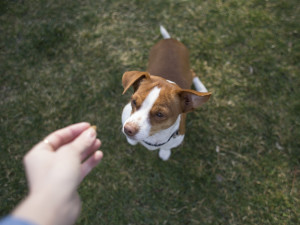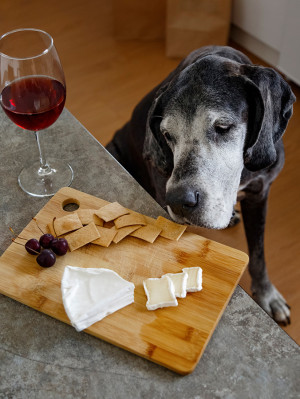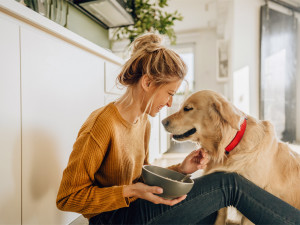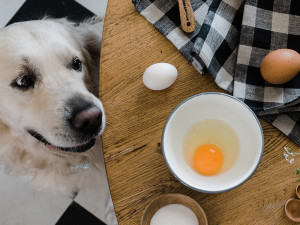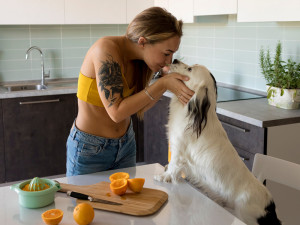Not many fish achieve superstardom, but if there’s one fish that’s next level — it’s salmon. Touted for its health benefits, viral recipe trends, and straight-up deliciousness, salmon is one food you can share with your pup as long as you follow some general guidelines. Salmon provides so many valuable nutrients for dogs that it is often a prime ingredient in many commercial dog foods. Read on to learn more about salmon and dogs.
Nutrition facts about salmon for dogs
Salmon is a cold-water fish that is very popular as a food source around the world because of its flavor and health benefits. Salmon is the common name for multiple species of fish including both Atlantic salmon and Pacific salmon species. These fish have a migratory lifestyle, which involves spawning, or mating and laying eggs, in fresh water where the young fish mature. They then travel to the ocean where they live as adults until they return to freshwater to spawn.
Many species of wild salmon are protected around the world, so a large portion of the salmon found in grocery stores is farmed. Salmon contains many valuable nutrients including protein, fats, vitamins, minerals, and antioxidants that are beneficial to dogs and humans alike.
Is salmon good for dogs?
Salmon is a good source of many nutrients for dogs. When it is part of a complete and balanced diet, it can be very healthy for them. Some of the major benefits of salmon include:
How much do you spend on your pet per year?
Protein: Salmon is high in protein, which is a critical nutrient for dogs. Protein provides energy and amino acids necessary to build muscles, enzymes, and new proteins in the body.
Fat: Salmon is also rich in omega 3 fatty acids (EPA and DHA). These fats are a good source of energy and also support healthy skin and coats. They can help to reduce inflammation and may have protective effects on the heart and brain.
Vitamins and minerals: Eating salmon is a good way to get important vitamins and minerals, including vitamin B6, vitamin B12, selenium, niacin, and thiamin. These nutrients play many vital roles in the body such as repairing DNA and supporting healthy growth, heart health, and brain and nerve function.
Antioxidants: Salmon contains a special antioxidant called astaxanthin which is a carotenoid that comes from a select few marine sources. It protects cells against damage from free radicals which may slow the aging process, reduce inflammation, and decrease the risk of certain cancers.
Can dogs eat any kind of salmon?
All species of salmon are safe for dogs to eat, but it’s important to always serve cooked salmon to dogs. This is because salmon and some other kinds of fish can contain a bacteria known as Neorickettsia helminthoeca, which can cause a serious condition known as salmon poisoning in dogsopens in new tab.
Dogs most commonly get sick in the Pacific Northwest when they eat freshly caught salmon but, in theory, any tissue from the fish can contain this parasite. Humans do not get sick from it, and the bacteria can be killed by thoroughly cooking the fish to an internal temperature of 145 degrees Fahrenheit. If you suspect your dog has eaten raw salmon, contact your vet right away; early treatment can be life-saving.
Is salmon completely safe for dogs?
Salmon is quite safe for dogs and can provide many valuable health benefits. Be sure to keep the following considerations in mind when sharing salmon with your pup:
High-fat content: Salmon is a high-fat food, which provides many health benefits to dogs. However, it is important to factor these added calories into your dog’s total intake to avoid accidentally overfeeding your pup and putting them at risk for weight gain. Some dogs don’t tolerate high-fat foods very well and may be susceptible to digestive upset including vomiting, diarrhea, or more serious pancreatitis. Be sure to speak with your vet if you are not sure whether your dog should eat high-fat foods.
Other ingredients: While salmon is healthy for dogs, the way it is prepared may not be. Try to avoid sharing salmon with your pup if it has been cooked with unhealthy or potentially toxic ingredients, including lots of salt, high fat dairy products like cream or butter, onions, garlic, chives, or spicy chilis. The best way to share salmon with your dog is to set aside a plain piece of fish that is baked or steamed without any additional ingredients.
Avoid skin and bones: Be sure to also remove the skin and bones before sharing salmon with your dog. These parts of the fish can be choking hazards, and sharp bones can cause injury and irritation to the digestive tract.
Cooked fish only: Only cooked salmon is safe for dogs. Due to the risk of salmon poisoning, dogs should never eat raw or undercooked salmon. All raw fish also carry a risk of other pathogens including Salmonella, so cooked fish is always the safest option.
The bottom line: Can dogs eat human food?
Dogs can eat lots of different human foods, and it can be a real eye opener to learn what foods your dog loves and which ones they snub. Always do your research to be sure that the foods you want to share are safe and non-toxic to dogs.
While dogs are omnivores and can eat a wide range of foods, they also have unique nutritional needs that differ from ours. Some foods that are perfectly safe for us are highly toxic to dogs, so it’s good to know which ones need to be kept far out of reach. It is also important to ensure your dog gets the bulk of their diet, approximately 90 percent of their calories, from a complete and balanced dog food. This is the best way to meet all of their nutritional needs and prevent any serious deficiencies. It also helps to balance their overall food intake and avoid accidentally overfeeding them which may lead to weight gain and related health problems.
Other foods that are safe for dogs
Blueberries and other berries that are lower in sugar make a healthy pup snack.
Butternut squash is a safe and nutritious option, too.
Peanuts can be a protein-packed snack as long as you follow some basic guidelines.
Other foods that are dangerous
Rib bones are risky for many reasons and should never be shared.
Grapes and raisins are toxic to dogs and must be kept out of reach.
Chocolate is also toxic to dogs and cannot be shared.
FAQs (People also ask):
How much salmon can a dog eat?
Plain, cooked salmon can be up to ten percent of your dog’s total caloric intake. It is best to start with a small taste to ensure your dog tolerates it well.
Is it OK to give dogs salmon?
It is ok to give dogs plain, cooked salmon as long as it does not contain skin or bones.
Why do dogs like salmon?
Dogs enjoy the flavor of foods that are rich in fat and protein, like salmon.
Can dogs eat raw salmon?
No, dogs should not eat raw salmon due to the risk of Salmon Poisoning Disease.
Can dogs eat smoked salmon?
Smoked salmon is very high in salt and some forms are not heated to a high enough temperature to destroy bacteria that can make dogs sick. It should not be shared with dogs.








